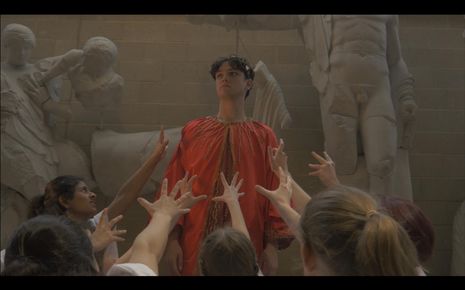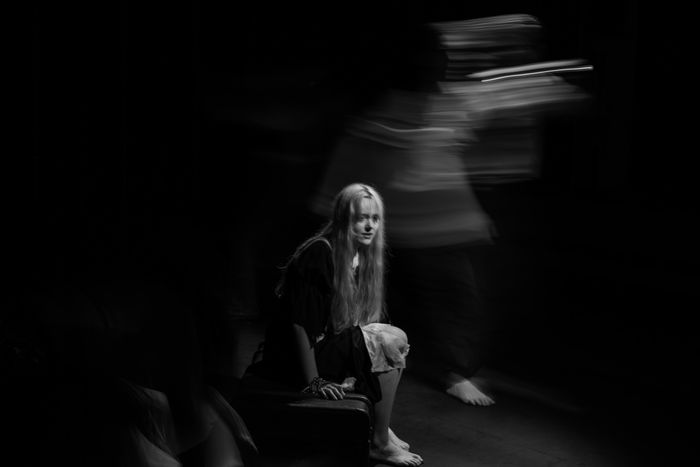Oedipus Tyrannus is not the mother of all performances
Supriya Finch finds this ADC adaptation struggles to reconcile the ancient and the modern

We all know the story of Oedipus Tyrannus. I read it when I was fourteen, determinedly ploughing my way through Sophocles plays in search of that sweet, sweet cultural capital that I was sure would get me into Oxford (oh, how times have changed). From the Freudian complex which seems determined to crop up in every third essay I come across, to the iconic Tom Lehrer tune, Oedipus’s story is de rigueur cultural knowledge.
Ella Joralemon and Johnathon Wilson’s new production of Oedipus has to contend with the weight of the tragedy’s huge cultural presence. For one thing, no one in the room is in any doubt about how it’s going to end, leading many of us to giggle nervously in serious moments due to the intense dramatic irony and leaving me unsure whether the comedy was intentional or not. In some ways, this does the play a favour, calling attention to the neat tragic structure where Oedipus’s fate will completely reverse itself, taking him from a king decreeing that his city’s polluter must be punished, to the man who finds himself subject to this decree. The visual symmetry, created by the chorus’s physical onstage presence, along with their changing sides at the end of the first act, was a neat wink to camera, acting as a nice contrast to the snappy acting as the penny finally drops for Oedipus.
“The production struggled to choose between the notions of the chorus as a unified mass, and as a group of individuals”
The play’s long history did, however, provide the cast with quite a few stumbling blocks. The production struggled to choose between the notions of the chorus as a unified mass, and as a group of individuals, with the actors swinging between tenuous synchronicity and occasionally hammy character acting that pulled my attention every-which-way when it would have been better focussed on the protagonists (a phenomenon exemplified by the fact that the chorus’s background acting was sometimes so loud that it was difficult to hear the protagonists speak). Modern adaptations of Greek tragedies often try to innovate the chorus, trying to force individual characters into lines that aren’t designed to hold up under so many intentions and so much individual emotion, ultimately causing the play to collapse under the weight. Though many of the ways in which the chorus were used were conceptually interesting, for me they just didn’t come together, appearing somewhat messy and unconvincing.
Other conceptual leaps met a mixed reception. While I didn’t particularly understand the choice to split the great rhetorician Creon in three for one scene, other audience members I spoke to thought it was an effective move to emphasise his rhetorical powers (which I had felt were quite diminished). Some commented on how beautiful the costume was, with Tiresias’s ivy-covered outfit in particular attracting compliments, where I personally found the overall aesthetic frustratingly incoherent and very difficult to place, both geographically and historically. I overheard one unimaginative audience member complain about the use of they/them pronouns for Tiresias, whereas I very much admired the decision and thought it was an interesting, intelligent choice for a character whose backstory does such interesting things with gender (Tiresias was transformed into a woman for ten years of his life). Though the intense glitz of Shaira Berg’s Jocasta outfit split opinion among my friends, we all loved the choice to make her wifely affection look uncomfortably close to motherly love as she pinched her husband’s cheek and smoothed his clothes.
“The cast made a valiant effort to rise to the slightly drawn-out nature of Greek tragedies”
The cast made a valiant effort to rise to the slightly drawn-out nature of Greek tragedies, and on the whole they were able to keep the energy up throughout. Though they didn’t quite manage to convey the classic tragic structure, where the energy and tension ratchets up and up to the inevitable end, this was in part due to the difficulty in building tension in a play which everyone knows the ending to. Ultimately, no one could say that the end fell flat, with Ryan Keys’s Oedipus bringing the play to its tear-drenched conclusion with incredibly raw emotion, and Daphne Stavride’s Fate delivering sardonic and yet strangely eerie commentary that felt very fresh and interesting.
Overall, the play is an ambitious feat. To bring an ancient Greek tragedy to the stage in 2024 is a bold move which requires careful thinking and choreography. Unfortunately, for me, the play didn’t quite manage to walk the line between ancient and modern, ending up as a battle between a source material which doesn’t quite fit modern expectations of theatre and a production which was determined to make it fit anyway. However, nothing can take away from the great performances given by many of the actors, nor can it detract from the audacious originality of many directorial and design choices, and if they ever decide to have another try I’d be interested to see it.
Oedipus Tyrannus is showing at 7:45pm at the ADC Theatre until Saturday 25th May.
 News / Judge Business School advisor resigns over Epstein and Andrew links18 February 2026
News / Judge Business School advisor resigns over Epstein and Andrew links18 February 2026 News / Gov grants £36m to Cambridge supercomputer17 February 2026
News / Gov grants £36m to Cambridge supercomputer17 February 2026 News / CUCA members attend Reform rally in London20 February 2026
News / CUCA members attend Reform rally in London20 February 2026 News / Union speakers condemn ‘hateful’ Katie Hopkins speech14 February 2026
News / Union speakers condemn ‘hateful’ Katie Hopkins speech14 February 2026 News / Hundreds of Cambridge academics demand vote on fate of vet course20 February 2026
News / Hundreds of Cambridge academics demand vote on fate of vet course20 February 2026










